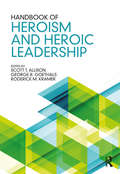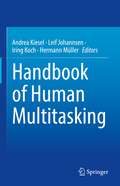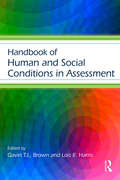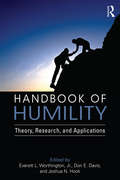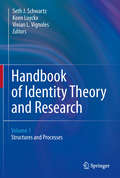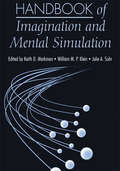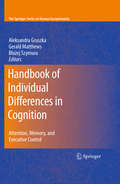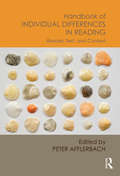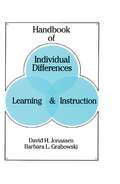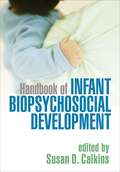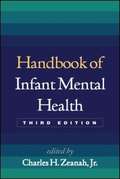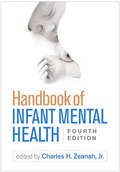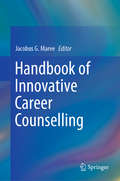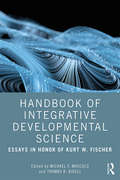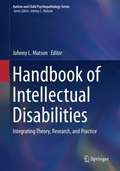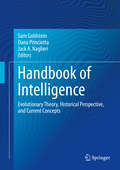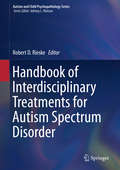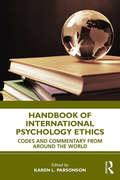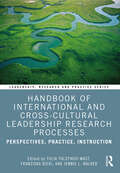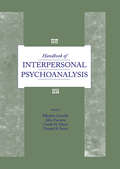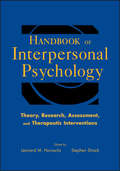- Table View
- List View
Handbook of Heroism and Heroic Leadership
by Roderick M. Kramer George R. Goethals Scott T. AllisonOver the past decade, research and theory on heroism and heroic leadership has greatly expanded, providing new insights on heroic behavior. The Handbook of Heroism and Heroic Leadership brings together new scholarship in this burgeoning field to build an important foundation for further multidisciplinary developments. In its three parts, "Origins of Heroism," "Types of Heroism," and "Processes of Heroism," distinguished social scientists and researchers explore topics such as morality, resilience, courage, empathy, meaning, altruism, spirituality, and transformation. This handbook provides a much-needed consolidation and synthesis for heroism and heroic leadership scholars and graduate students.
Handbook of Human Multitasking
by Hermann Müller Andrea Kiesel Iring Koch Leif JohannsenThis handbook on human multitasking provides an integrative overview on simultaneous and sequential multitasking and thus combines theorizing on dual task limitations as well as costs related to task switching. In addition to a wide range of empirical findings and their theoretical integration, the editors provide a number of applications of multitasking, like training, interindividual differences and applied research in traffic and health psychology and music expertise.The book is suitable for people interested in multitasking, that is, for researchers and graduate students of cognitive psychology, movement science, sport psychology, cognitive neuroscience, cognitive and neurological rehabilitation, aging sciences, and broader cognitive science.
Handbook of Human and Social Conditions in Assessment (Educational Psychology Handbook)
by Gavin T. L. Brown and Lois R. HarrisThe Handbook of Human and Social Conditions in Assessment is the first book to explore assessment issues and opportunities occurring due to the real world of human, cultural, historical, and societal influences upon assessment practices, policies, and statistical modeling. With chapters written by experts in the field, this book engages with numerous forms of assessment: from classroom-level formative assessment practices to national accountability and international comparative testing practices all of which are significantly influenced by social and cultural conditions. A unique and timely contribution to the field of Educational Psychology, the Handbook of Human and Social Conditions in Assessment is written for researchers, educators, and policy makers interested in how social and human complexity affect assessment at all levels of learning. Organized into four sections, this volume examines assessment in relation to teachers, students, classroom conditions, and cultural factors. Each section is comprised of a series of chapters, followed by a discussant chapter that synthesizes key ideas and offers directions for future research. Taken together, the chapters in this volume demonstrate that teachers, test creators, and policy makers must account for the human and social conditions that shape assessment if they are to implement successful assessment practices which accomplish their intended outcomes.
Handbook of Humility: Theory, Research, and Applications
by Everett L. Worthington Jr. Joshua N. Hook Don E. DavisThe Handbook of Humility is the first scholarly book to bring together authors from psychology as well as other fields to address what we know and don’t know about humility. Authors review the existing research in this burgeoning field that has well over 100 empirical articles and an increasing trajectory of publication. This work should form the basis for research in humility for many years. In this book, chapters address definitions of humility that guide research. Authors also reflect on the practical applications of humility research within the areas they reviewed. The book informs people who study humility scientifically, but it is also an exceptional guide for psychotherapists, philosophers, religious and community leaders, politicians, educated lay people, and those who would like to fuel an informed reflection on how humility might make interactions more civil in relationships, organizations, communities, political processes, and national and international relations.
Handbook of Identity Theory and Research
by Vivian L. Vignoles Koen Luyckx Seth J. SchwartzIdentity is one of the most extensively studied constructs in the social sciences. Yet, despite the wealth of findings across many disciplines, identity researchers remain divided over such enduring fundamental questions as: What exactly is identity, and how do identity processes function? Do people have a single identity or multiple identities? Is identity individually or collectively oriented? Personally or socially constructed? Stable or constantly in flux? The Handbook of Identity Theory and Research offers the rare opportunity to address the questions and reconcile these seeming contradictions, bringing unity and clarity to a diverse and fragmented literature. This exhaustive reference work emphasizes the depth and complexity of identity processes and domains and presents perspectives from many different theoretical schools and empirical approaches. Contributing authors provide perspectives from psychology (e.g., narrative, social identity theory, neo-Eriksonian) and from other disciplines (e.g., sociology, political science, ethnic studies); and the editors highlight the links between chapters that provide complementary insights on related subjects. In addition to covering identity processes and categories that are well-known to the field, the Handbook tackles many emerging issues, including: - Identity development among adopted persons. - Identity processes in interpersonal relationships. - Effects of globalization on cultural identity. - Transgender experience and identity. - Consumer identity and shopping behavior. - Social identity processes in xenophobia and genocide. The Handbook of Identity Theory and Research lends itself to a wealth of uses by scholars, clinicians, and graduate students across many disciplines, including social, developmental, and child/school psychology; human development and family studies; sociology; cultural anthropology; gender, ethnic, and communication studies; education; and counseling.
Handbook of Imagination and Mental Simulation
by Et. Al. Keith D. Markman William M. P. KleinOver the past thirty years, and particularly within the last ten years, researchers in the areas of social psychology, cognitive psychology, clinical psychology, and neuroscience have been examining fascinating questions regarding the nature of imagination and mental simulation – the imagination and generation of alternative realities. Some of these researchers have focused on the specific processes that occur in the brain when an individual is mentally simulating an action or forming a mental image, whereas others have focused on the consequences of mental simulation processes for affect, cognition, motivation, and behavior. This Handbook provides a novel and stimulating integration of work on imagination and mental simulation from a variety of perspectives. It is the first broad-based volume to integrate specific sub-areas such as mental imagery, imagination, thought flow, narrative transportation, fantasizing, and counterfactual thinking, which have, until now, been treated by researchers as disparate and orthogonal lines of inquiry. As such, the volume enlightens psychologists to the notion that a wide-range of mental simulation phenomena may actually share a commonality of underlying processes.
Handbook of Implementation Science for Psychology in Education
by Barbara Kelly Daniel F. PerkinsImplementation Science is the science of the effectiveness of research for real-world practitioners. This book is an indispensable, highly innovative, and evidence-based resource aimed at utilizing research in psychology to improve all aspects of education, from individual teaching programs to organizational development. It addresses the widespread confusion and disappointment about the lack of effectiveness of real-world psychology and provides twenty-seven chapters offering proven policies, strategies, and approaches for designing, supporting, and improving interventions in schools. Collectively, the chapters go beyond the realm of psychology and education, tackling concerns about how to promote positive change in any context, covering topics from epistemology through statistics to examples of implementation approaches, frameworks and protocols. This book creates an immensely relevant body of information and evidence for any practitioner or organization facing the challenges of change. Essential reading for practitioners, policy makers, stakeholders, and funders in psychology, education, and beyond.
Handbook of Individual Differences in Cognition
by Gerald Matthews Blazej Szymura Aleksandra GruszkaAs cognitive models of behavior continue to evolve, the mechanics of cognitive exceptionality, with its range of individual variations in abilities and performance, remains a challenge to psychology. Reaching beyond the standard view of exceptional cognition equaling superior intelligence, the Handbook of Individual Differences in Cognition examines the latest findings from psychobiology, cognitive psychology, and neuroscience, for a comprehensive state-of-the-art volume. Breaking down cognition in terms of attentional mechanisms, working memory, and higher-order processing, contributors discuss general models of cognition and personality. Chapter authors build on this foundation as they revisit current theory in such areas as processing effort and general arousal and examine emerging methods in individual differences research, including new data on the role of brain plasticity in cognitive function. The possibility of a unified theory of individual differences in cognitive ability and the extent to which these variables may account for real-world competencies are emphasized, and commentary chapters offer suggestions for further research priorities. Coverage highlights include: The relationship between cognition and temperamental traits.The development of autobiographical memory.Anxiety and attentional control.The neurophysiology of gender differences in cognitive ability.Intelligence and cognitive control.Individual differences in dual task coordination.The effects of subclinical depression on attention, memory, and reasoning.Mood as a shaper of information.Researchers, clinicians, and graduate students in psychology and cognitive sciences, including clinical psychology and neuropsychology, personality and social psychology, neuroscience, and education, will find the Handbook of Individual Differences in Cognition an expert guide to the field as it currently stands and to its agenda for the future.
Handbook of Individual Differences in Reading: Reader, Text, and Context
by Peter AfflerbachThe central unifying theme of this state-of-the-art contribution to research on literacy is its rethinking and reconceptualization of individual differences in reading. Previous research, focused on cognitive components of reading, signaled the need for ongoing work to identify relevant individual differences in reading, to determine the relationship(s) of individual differences to reading development, and to account for interactions among individual differences. Addressing developments in each of these areas, this volume also describes affective individual differences, and the environments in which individual differences in reading may emerge, operate, interact, and change. The scant comprehensive accounting of individual differences in reading is reflected in the nature of reading instruction programs today, the outcomes that are expected from successful teaching and learning, and the manner in which reading development is assessed. An important contribution of this volume is to provide prima facie evidence of the benefits of broad conceptualization of the ways in which readers differ. The Handbook of Individual Differences in Reading moves the field forward by encompassing cognitive, non-cognitive, contextual, and methodological concerns. Its breadth of coverage serves as both a useful summary of the current state of knowledge and a guide for future work in this area.
Handbook of Individual Differences, Learning, and Instruction
by David H. Jonassen Barbara L. GrabowskiWritten for teachers, trainers, and instructional designers -- anyone who is responsible for designing or preparing instruction -- this book begins with one basic premise: individual differences mediate learning at all levels and in all situations. That is, some learners find it easier or more difficult to learn some skills or to learn from certain forms of instruction because they vary in terms of aptitude, cognitive styles, personality, or learning styles. This volume describes most of the major differences in a readable and accessible way and demonstrates how to design various forms of instruction and predict the ease with which learners will acquire different skills. Most books that discuss any learner differences focus on those that characterize special education populations, whereas this book focuses on normal learners. Designed as a handbook, this volume is structured to provide easy and consistent access to information and answers, and prescriptions and hypotheses. When definitive answers are not possible because there is no research documentation, the authors suggest theories designed to stimulate future research.
Handbook of Infant Biopsychosocial Development
by Susan D. CalkinsThe first two years of life are a period of unparalleled growth and change. Within a state-of-the-art biopsychosocial framework, this innovative volume explores the multiple contexts of infant development--the ways in which genes, neurobiology, behavior, and environment interact and shape each other over time. Methods for disentangling, measuring, and analyzing complex, nonlinear developmental processes are presented. Contributors explore influences on the infant's growth in major domains, including cognitive and socioemotional functioning and mental health. The consequences of family stress, poverty, and other adversities are probed, and promising directions for prevention and intervention identified.
Handbook of Infant Mental Health
by Charles H. ZeanahWidely regarded as the standard reference in the field, this state-of-the-art Handbook offers a comprehensive analysis of developmental, clinical, and social aspects of mental health from birth to the preschool years. Leading authorities explore models of development; biological, family, and sociocultural risk and protective factors; and frequently encountered disorders and disabilities. Evidence-based approaches to assessment and treatment are presented, with an emphasis on ways to support strong parent-child relationships. The volume reviews the well-documented benefits of early intervention and prevention and describes applications in mental health, primary care, childcare, and child welfare settings. The chapter on psychopharmacology has been updated for the paperback edition.
Handbook of Infant Mental Health, Fourth Edition
by Charles H. Zeanah Jr.The definitive reference in the field--now significantly revised with 75% new material--this volume examines typical and atypical development from birth to the preschool years and identifies what works in helping children and families at risk. Foremost experts explore neurobiological, family, and sociocultural factors in infant mental health, with a major focus on primary caregiving relationships. Risk factors for developmental problems are analyzed, and current information on disorders and disabilities of early childhood is presented. The volume showcases evidence-based approaches to assessment and intervention and describes applications in mental health, primary care, child care, and child welfare settings. New to This Edition: *Chapters on genetic and epigenetic processes, executive functions, historical trauma, and neglect. *Chapters on additional clinical problems: hyperactivity and inattention, sensory overresponsivity, and relationship-specific disorder. *Chapters on additional interventions: attachment and biobehavioral catch-up, video-feedback intervention to promote positive parenting and sensitive discipline, parent–child interaction therapy, and home visiting programs. *Existing chapters all rewritten or revised to reflect a decade's worth of empirical and clinical advances.
Handbook of Innovative Career Counselling
by Jacobus G. MareeThis book examines a topic widely regarded as the most pressing in career counselling today, i.e., how to ensure that everyone receives career counselling and that all workers have the opportunity to engage in sustainable, decent work. The author holds that career counselling should not only advance workers’ self- and career construction, helping them design successful career-lives and make social contributions, and live purposeful lives – it should also expound new theoretical approaches and interventions. Furthermore, the book criticizes global society for overlooking the basic needs of many workers, especially the most vulnerable and disadvantaged. An important feature of the book is its emphasis on promoting a creative and innovative approach to career counselling so as to better answer contemporary career-related questions. It offers guidance on how to advance entrepreneurship and help workers develop critical thinking, curiosity, creativity, collaboration, and communication skills. In this way the book promotes innovation in career counselling and maps the way forward in a theoretical and practical manner that helps clients ‘flourish’ rather than merely ‘survive’ in turbulent times impacted by the fourth wave in psychology, career counselling, the economy, as well as the 4th industrial revolution (Work 4.0).
Handbook of Integrative Developmental Science: Essays in Honor of Kurt W. Fischer
by Michael F. Mascolo Thomas R. BidellAlthough integrative conceptions of development have been gaining increasing interest, there have been few attempts to bring together the various threads of this emerging trend. The Handbook of Integrative Developmental Science seeks ways to bring together classic and contemporary theory and research in developmental psychology with an eye toward building increasingly integrated theoretical and empirical frameworks. It does so in the form of a festschrift for Kurt Fischer, whose life and work have both inspired and exemplified integrative approaches to development. Building upon and inspired by the comprehensive scope of Fischer’s Dynamic Skill Theory, this book examines what an integrated theory of psychological development might look like. Bringing together the work of prominent integrative thinkers, the volume begins with an examination of philosophical presuppositions of integrative approaches to development. It then shows how Dynamic Skill Theory provides an example of an integrative model of development. After examining the question of the nature of integrative developmental methodology, the volume examines the nature of developmental change processes as well as pathways and processes in the development of psychological structures both within and between psychological domains. The team of expert contributors cover a range of psychological domains, including the macro- and micro-development of thought, feeling, motivation, self, intersubjectivity, social relations, personality, and other integrative processes. It ends with a set of prescriptions for the further elaboration of integrative developmental theory, and a tribute to Kurt Fischer and his influence on developmental psychology. This book will be essential reading for graduate students and researchers of developmental psychology and human development, specifically developmental science.
Handbook of Intellectual Disabilities (International Review Of Research In Mental Retardation Ser. #Volume 34)
by Johnny MatsonThis handbook details best practices and discusses ongoing challenges in assessment and diagnosis of autism spectrum disorder (ASD). Chapters address assessment and diagnostic protocols, developmental considerations in ASD assessment, and issues concerning comorbid psychological and medical conditions. Various aspects of the disorder are emphasized throughout the handbook - from assessment in adolescent and adult populations to the latest findings in neuropsychology. The book concludes with future directions for research and clinical applications, focusing on universal screening, improved assessment methods, and earlier and more accurate diagnosis.
Handbook of Intellectual Disabilities: Integrating Theory, Research, and Practice (Autism and Child Psychopathology Series #Volume 34)
by Johnny L. MatsonThis handbook offers a comprehensive review of intellectual disabilities (ID). It examines historical perspectives and foundational principles in the field. The handbook addresses philosophy of care for individuals with ID, as well as parent and professional issues and organizations, staffing, and working on multidisciplinary teams. Chapters explore issues of client protection, risk factors of ID, basic research issues, and legal concerns. In addition, chapters include information on evidence-based assessments and innovative treatments to address a variety of behaviors associated with ID. The handbook provides an in-depth analysis of comorbid physical disorders, such as cerebral palsy, epilepsy and seizures, and developmental coordination disorders (DCD), in relation to ID.Topics featured in this handbook include:Informed consent and the enablement of persons with ID. The responsible use of restraint and seclusion as a protective measure. Vocational training and job preparation programs that assist individuals with ID. Psychological and educational approaches to the treatment of aggression and tantrums. Emerging technologies that support learning for students with ID. Key sexuality and relationship issues that are faced by individuals with ID.Effective approaches to weight management for individuals with intellectual and developmental disabilities. The Handbook of Intellectual Disabilities is an essential reference for researchers, graduate students, clinicians and related therapists and professionals in clinical child and school psychology, pediatrics, social work, developmental psychology, behavioral therapy/rehabilitation, child and adolescent psychiatry, and special education.
Handbook of Intelligence
by Sam Goldstein Jack A. Naglieri Dana PrinciottaNumerous functions, cognitive skills, and behaviors are associated with intelligence, yet decades of research has yielded little consensus on its definition. Emerging from often conflicting studies is the provocative idea that intelligence evolved as an adaptation humans needed to keep up with - and survive in - challenging new environments. The Handbook of Intelligence addresses a broad range of issues relating to our cognitive and linguistic past. It is the first full-length volume to place intelligence in an evolutionary/cultural framework, tracing the development of the human mind, exploring differences between humans and other primates, and addressing human thinking and reasoning about its own intelligence and its uses. The works of pioneering thinkers - from Plato to Darwin, Binet to Piaget, Luria to Weachsler - are referenced to illustrate major events in the evolution of theories of intelligence, leading to the current era of multiple intelligences and special education programs. In addition, it examines evolutionary concepts in areas as diverse as creativity, culture, neurocognition, emotional intelligence, and assessment. Featured topics include: The evolution of the human brain from matter to mind Social competition and the evolution of fluid intelligence Multiple intelligences in the new age of thinking Intelligence as a malleable construct From traditional IQ to second-generation intelligence tests The evolution of intelligence, including implications for educational programming and policy. The Handbook of Intelligence is an essential resource for researchers, graduate students, clinicians, and professionals in developmental psychology; assessment, testing and evaluation; language philosophy; personality and social psychology; sociology; and developmental biology.
Handbook of Interdisciplinary Treatments for Autism Spectrum Disorder (Autism and Child Psychopathology Series)
by Robert D. RieskeThis handbook examines the medical and therapeutic needs of individuals with autism spectrum disorder (ASD) and the effectiveness of treatments that are delivered through interdisciplinary teams. It analyzes the impact of interdisciplinary teams on assessment, diagnosis, treatment planning, and implementation and explores how evidence-based treatments can be developed and implemented. Chapters describe the wide-ranging effects of ASD and the challenges individuals and their family members face when seeking treatment. In addition, chapters provide an overview of the comorbidities and related disorders that often accompany ASD, including neurodevelopmental disorders, medical and behavioral problems, and psychopathology. The handbook also discusses the critical importance of caregivers in the treatment team as experts in their child’s strengths, problem areas, and functioning. Topics featured in this handbook include:Legal considerations in interdisciplinary treatments.Ethical considerations in the development and implementation of interdisciplinary teams.Evidence-based interdisciplinary treatment and evaluation considerations.The role of primary care physicians and subspecialty pediatricians within interdisciplinary teams. The impact of school psychologists related to assessment and intervention development. Vocational interventions that promote independence in individuals with ASD. The Handbook of Interdisciplinary Treatments for Autism Spectrum Disorder is a must-have resource for researchers, clinicians and professionals, and graduate students across such interrelated disciplines as clinical child, school, and developmental psychology, child and adolescent psychiatry, social work, rehabilitation medicine/therapy, pediatrics, and special education.
Handbook of International Feminisms
by Rose Capdevila Ingrid Palmary Alexandra Rutherford Vindhya UndurtiThe goal of Handbook of International Perspectives on Feminism is to present the histories, status, and contours of feminist research and practice in their respective regional and/or national contexts. The editors have invited researchers who are doing this work to present their perspectives on women, culture, and rights with the objective to illuminate the diverse forms that feminist psychological work takes around the world, and connect these forms with the unique positions and concerns of women in these regions. What does "feminist psychology" look like in Japan? In South Africa? In Sri Lanka? In Canada? In Brazil? How did it come to look this way? How do psychologists in these countries or regions, each with unique political, economic, and cultural histories, engage in feminist work in the societies in which they live? How do they employ the tools of "psychology" - broadly defined - to do this work, and what tensions and challenges have they faced?
Handbook of International Psychology Ethics: Codes and Commentary from Around the World
by Karen L. ParsonsonThe Handbook of International Psychology Ethics discusses the most central, guiding principles of practice for mental health professionals around the world. For researchers, practicing mental health professionals, and students alike, the book provides a window into the values and belief systems of cultures worldwide. Chapters cover ethics codes from psychological associations and societies on five continents, translating each code into English and discussing vital questions around how the code is put into practice, what it means to association members and society at large, as well as how the code was developed within its unique historical, political, and cultural context.
Handbook of International and Cross-Cultural Leadership Research Processes: Perspectives, Practice, Instruction (ISSN)
by Yulia Tolstikov-MastAn invaluable contribution to the area of leadership studies, the Handbook of International and Cross-Cultural Leadership Research Processes: Perspectives, Practice, Instruction brings together renowned authors with diverse cultural, academic, and practitioner backgrounds to provide a comprehensive overview and analysis of all stages of the research process.The handbook centers around authors’ international research reflections and experiences, with chapters that reflect and analyze various research experiences in order to help readers learn about the integrity of each stage of the international leadership research process with examples and discussions. Part I introduces philosophical traditions of the leadership field and discusses how established leadership and followership theories and approaches sometimes fail to capture leadership realities of different cultures and societies. Part II focuses on methodological challenges and opportunities. Scholars share insights on their research practices in different stages of international and cross-cultural studies. Part III is forward-looking in preparing readers to respond to complex realities of the leadership field: teaching, learning, publishing, and applying international and cross-cultural leadership research standards with integrity. The unifying thread amongst all the chapters is a shared intent to build knowledge of diverse and evolving leadership practices and phenomena across cultures and societies.The handbook is an excellent resource for a broad audience including scholars across disciplines and fields, such as psychology, management, history, cognitive science, economics, anthropology, sociology, and medicine, as well as educators, consultants, and graduate and doctoral students who are interested in understanding authentic leadership practices outside of the traditional Western paradigm.
Handbook of International and Cross-Cultural Leadership Research Processes: Perspectives, Practice, Instruction (Leadership: Research and Practice)
by Yulia Tolstikov-MastAn invaluable contribution to the area of leadership studies, the Handbook of International and Cross-Cultural Leadership Research Processes: Perspectives, Practice, Instruction brings together renowned authors with diverse cultural, academic, and practitioner backgrounds to provide a comprehensive overview and analysis of all stages of the research process. The handbook centers around authors’ international research reflections and experiences, with chapters that reflect and analyze various research experiences in order to help readers learn about the integrity of each stage of the international leadership research process with examples and discussions. Part I introduces philosophical traditions of the leadership field and discusses how established leadership and followership theories and approaches sometimes fail to capture leadership realities of different cultures and societies. Part II focuses on methodological challenges and opportunities. Scholars share insights on their research practices in different stages of international and cross-cultural studies. Part III is forward-looking in preparing readers to respond to complex realities of the leadership field: teaching, learning, publishing, and applying international and cross-cultural leadership research standards with integrity. The unifying thread amongst all the chapters is a shared intent to build knowledge of diverse and evolving leadership practices and phenomena across cultures and societies. The handbook is an excellent resource for a broad audience including scholars across disciplines and fields, such as psychology, management, history, cognitive science, economics, anthropology, sociology, and medicine, as well as educators, consultants, and graduate and doctoral students who are interested in understanding authentic leadership practices outside of the traditional Western paradigm.
Handbook of Interpersonal Psychoanalysis
by John Fiscalini Donnel B. Stern Carola Mann Marylou LionellsA decade in the making, the Handbook is the definitive contemporary exposition of interpersonal psychoanalysis. It provides an authoritative overview of development, psychopathology, and treatment as conceptualized from the interpersonal viewpoint.
Handbook of Interpersonal Psychology
by Leonard M. Horowitz Stephen StrackModern interpersonal psychology is now at a point where recent advances need to be organized so that researchers, practitioners, and students can understand what is new, different, and state-of-the art. This field-defining volume examines the history of interpersonal psychology and explores influential theories of normal-abnormal behaviors, widely-used assessment measures, recent methodological advances, and current interpersonal strategies for changing problematic behaviors. Featuring original contributions from field luminaries including Aaron Pincus, John Clarkin, David Buss, Louis Castonguay, and Theodore Millon, this cutting-edge volume will appeal to academicians, professionals, and students interested in the study of normal and abnormal interpersonal behavior.
